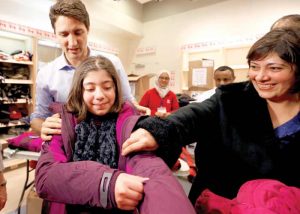Baby names are a bellwether for the way people experience politics: Intensely. Madly. Often times, precariously.
So it was that in Canada, Justin Trudeau recently met Justin Trudeau. The first is a 2-month-old Syrian baby. The other is prime minister of the country that gave gracious refuge to the infant’s parents, Muhammad and Afraa Bilan from Damascus. For all that he was asleep through much of the momentous meeting, the mini-Trudeau is part of the inclusive conversation pursued by his famous namesake.
In Germany, a mini-Angela Merkel, about 18 months old, is proof of the deep gratitude felt by her parents, Mamon and Tema al-Hamza, towards the country’s chancellor. In autumn 2015, Merkel the German leader took in the Hamzas and hundreds of thousands of other Syrian refugees when no one else would. Reports in the months after the refugees surged into Germany stated that many newborn Syrian babies were named “Angela Merkel.”
Clearly, baby names are serious business. Often, they are more than a social trend. They can be a lifeline, a meal ticket, a way to show solidarity with a brutal regime. Why else would thousands of Iraqis name their sons Saddam Hussein from the 1970s to the 1990s?
The politics and symbolism of baby names run deep in almost every country. In Germany, “Adolf Hitler” is not permitted. In Belgium, “Jerusalem” is a no-no. Portugal does not allow a baby to be named “Africa.” Brazil forbids ‘”Saddam Hussein.” In China’s Muslim-majority province of Xinjiang, “Islam,” “Quran,” “Mecca,” “Jihad,” “Imam,” “Saddam,” “Hajj” and “Medina” are among dozens of religiously suspicious baby names banned under the Chinese Communist Party’s “Naming Rules for Ethnic Minorities.”
In our restless times, the Syrian Angela Merkels and Justin Trudeaus stand apart from the baby Beyonces, Brad Pitts and Angelina Jolies scattered around the world. Their names are not a cultural whim, a reflection of the changing fashions of the day, with its rotating cast of celebrities.
Baby names are a marker of the politics of their time. Consider the minor war of names that erupted around the Qatar crisis a few weeks ago. In a video posted on Twitter, a Saudi man draped his daughter in his country’s flag and declared he was naming his first-born Al Saudia. It was, he said in “response to the Kuwaiti citizen who named his daughter Qatar.” Whatever happens in that impasse, Baby Al Saudia and Baby Qatar will always be a living representation of an unedifying, unusually bad-tempered public battle of wills in the Gulf region.
Sometimes baby names can go further than politics and become culturally inflammatory. In Britain, there is increasing debate over the alleged statistical rise of “Mohammed” as one of, if not the most popular boys’ name in England and Wales.
Late last year, data from the British Office for National Statistics indicated that “Mohammed” appeared with so many spelling variations in 2015 it might have edged out all the other typically English and Welsh boys’ names. The differently spelled versions of “Mohammed” appeared 7,570 times on birth certificates, outstripping the 6,941 babies named Oliver, which was the top English and Welsh boy’s name.
To the Islamophobes and the insular, the data suggested an incipient cultural takeover by Muslims. They argued that Muslims were either breeding like rabbits or entering Britain as immigrants in large enough numbers to change the demographic ratio. The Muslim community in England and Wales, however, remains a piffling 5% of the population and it’s entirely possible that Mohammed has become popular as a baby name for other, less sinister, reasons. These would include the popularity of sports heroes such as the late boxer Muhammad Ali and Olympian Mohamed (Mo) Farah.
That said, a survey by parenting forum ChannelMum.com indicated a 6% rise in the use of Muslim names by non-Muslim families. Zane, Zahra, Farah and Omar gained ground, said the survey. The name Mohammed wasn’t mentioned. The only possible explanation is that the listed names travel easily across countries and cultures. Perhaps non-Muslim British parents are of the opinion such names give their children an advantage in a globalising world.
So, to the Syrian baby Trudeaus and Merkels. There is something deeply affecting about them. As adults, they will represent one of the truest and most human of instincts. They are a symbol of empathy with another — beyond kith and kin; beyond tribe, community or country. Help was offered to their parents, altruistically and in the spirit of humanity. Their parents responded with the highest honour they could afford.
To name your baby after someone is an aspirational act. It is a fervent wish, an honest hope that your progeny grows up to be like the child’s namesake. Which brings me to the second bit of little Angela Merkel al-Hamza’s story. Right around the time of her first birthday, the family was refused permanent asylum in Germany, though it retained the right to renew its stay for a year at a time.
I have not seen subsequent accounts that the Hamzas changed their daughter’s name in a fit of pique. I rather suspect they wouldn’t have. Her name, just like the German chancellor’s act of kindness, will probably stay forever frozen in time and family lore as a symbol of the power of human connection.





